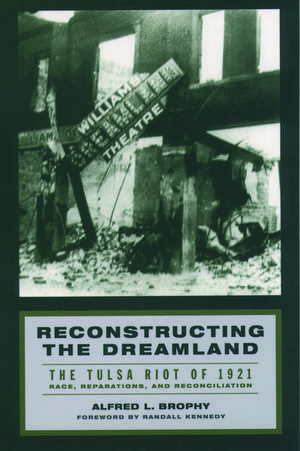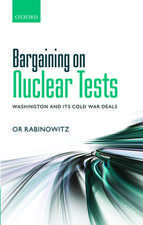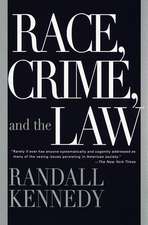Reconstructing the Dreamland: The Tulsa Race Riot of 1921. Race, Reparations, and Reconciliation
Autor Alfred L. Brophy Cuvânt înainte de Randall Kennedyen Limba Engleză Paperback – 3 apr 2003
Preț: 120.56 lei
Nou
Puncte Express: 181
Preț estimativ în valută:
23.07€ • 24.04$ • 19.18£
23.07€ • 24.04$ • 19.18£
Carte disponibilă
Livrare economică 21 ianuarie-04 februarie 25
Preluare comenzi: 021 569.72.76
Specificații
ISBN-13: 9780195161038
ISBN-10: 0195161033
Pagini: 208
Ilustrații: 9 halftones.7 line illus
Dimensiuni: 154 x 238 x 15 mm
Greutate: 0.3 kg
Editura: OUP OXFORD
Colecția OUP Oxford
Locul publicării:Oxford, United States
ISBN-10: 0195161033
Pagini: 208
Ilustrații: 9 halftones.7 line illus
Dimensiuni: 154 x 238 x 15 mm
Greutate: 0.3 kg
Editura: OUP OXFORD
Colecția OUP Oxford
Locul publicării:Oxford, United States
Recenzii
"Meticulously researched...., A good job of showing how the true history of the riot was whitewashed, and how difficult it has been for white Tulsa--and white America for that matter--to acknowledge its racist past."--San Diego Union Tribune
"Brophy's history of reparations is fascinating."--St. Louis Post Dispatch
"Recovers a largely forgotten history of black activism in one of the grimmest periods of race relations, emphasizing the black militancy of the World War I era and how assertive black demands for racial equality threatened white Tulsans. Linking history with advocacy, Brophy also offers a reasoned defense of reparations for the riot's victims."--Washington Post Book World
"At once meticulously factual and riveting, Alfred Brophy's moving account of a 1921 race riot that destroyed an economically self-reliant, vibrant African-American community clarifies why political action and enforcement of legal and human rights are indispensable perquisites for black economic opportunity and material progress. Brophy also clarifies why Americans need to find the courage to acknowledge injustices of the recent past and contrive amends to help heal still-unresolved consequences scarring both victims and perpetrators."--Jane Jacobs
"Timely, well documented and powerfully written...vividly illustrates a chapter of America's sordid racist past by focusing on the Tulsa Race Riots of 1921. If we are to transcend the barriers to racial progress, we all must read Brophy's compelling work and use it as a seminal case in our path to avoid conflicts at all costs.... Brophy's book is the best-written account of the Tulsa riots, and captures the people of Tulsa's resolve to never allow a similar travesty to occur again. Every person interested in racial justice should have this book at his or her disposal."--Charles J. Ogletree, Jr., Jesse Climenko Professor of Law, Harvard Law School
"A timely contribution to a variety of important and contentious discussions involving American history, African American culture, and the problems encountered in attempting to right past wrongs.... Brophy reminds us that deadly, cruel, racial violence is not something that only happens 'out there' in the rest of the world but is something that has also happened here in the United States on a massive scale and that just as others out there have fallen short in reckoning with their pasts, so too have Americans."--Randall Kennedy, from the Preface
"Brophy's history of reparations is fascinating."--St. Louis Post Dispatch
"Recovers a largely forgotten history of black activism in one of the grimmest periods of race relations, emphasizing the black militancy of the World War I era and how assertive black demands for racial equality threatened white Tulsans. Linking history with advocacy, Brophy also offers a reasoned defense of reparations for the riot's victims."--Washington Post Book World
"At once meticulously factual and riveting, Alfred Brophy's moving account of a 1921 race riot that destroyed an economically self-reliant, vibrant African-American community clarifies why political action and enforcement of legal and human rights are indispensable perquisites for black economic opportunity and material progress. Brophy also clarifies why Americans need to find the courage to acknowledge injustices of the recent past and contrive amends to help heal still-unresolved consequences scarring both victims and perpetrators."--Jane Jacobs
"Timely, well documented and powerfully written...vividly illustrates a chapter of America's sordid racist past by focusing on the Tulsa Race Riots of 1921. If we are to transcend the barriers to racial progress, we all must read Brophy's compelling work and use it as a seminal case in our path to avoid conflicts at all costs.... Brophy's book is the best-written account of the Tulsa riots, and captures the people of Tulsa's resolve to never allow a similar travesty to occur again. Every person interested in racial justice should have this book at his or her disposal."--Charles J. Ogletree, Jr., Jesse Climenko Professor of Law, Harvard Law School
"A timely contribution to a variety of important and contentious discussions involving American history, African American culture, and the problems encountered in attempting to right past wrongs.... Brophy reminds us that deadly, cruel, racial violence is not something that only happens 'out there' in the rest of the world but is something that has also happened here in the United States on a massive scale and that just as others out there have fallen short in reckoning with their pasts, so too have Americans."--Randall Kennedy, from the Preface
Notă biografică
Alfred L. Brophy is Professor of Law at the University of Alabama, in Tuscaloosa. An authority on the 1921 riot, he contributed to the report to the Tulsa Race Riot Commission, a body created by the Oklahoma Legislature to investigate the riot and make recommendations for reparations.










